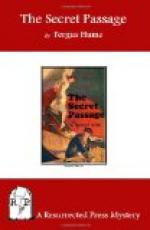“Yes. He is a page in the house. Well?”
“I gave him a drink or two,” said Drudge, “and a few stamps, as he is a collector. He become friendly with me, and I asked him about the house. He was very frank, but he said nothing about the gambling.”
“Humph! I expect he has been told to hold his tongue. Well, did you hear anything at all?”
“I heard that Gibber had never seen Mrs. Herne. He did not even know her name. Now, sir,” went on Drudge, laying a finger in the palm of his hand, “if Mrs. Herne was stopping at the Soho house, Gibber would have seen her.”
A flash of joy passed across the countenance of Jennings, but he turned away from his underling so that he might not betray the satisfaction he felt. “Mrs. Herne is Maraquito’s aunt,” he said again.
“No, sir, pardon me. Maraquito hasn’t got an aunt. Leastways the aunt, if there is such a person, has never set foot in the house.”
“Perhaps Maraquito sees her secretly.”
“Well,” said Drudge pensively, “she certainly went in by a side door, Mr. Jennings. Do you want me to watch further, sir?”
“Yes. Keep your eye on the Soho house, and should Mrs. Herne reappear, follow her. Anything else?”
“Yes, sir. Mrs. Herne when walking down the hill dropped a small bag.”
“Ah! Have you got it?”
“No. She was too sharp for me. I was picking it up when she missed it and came to claim it. But before she reached me I had opened it. Only her handkerchief was inside. I gave it back, and she gave me a shilling. But the queer thing, sir, is the scent.”
“What scent?” asked Jennings, looking keenly at the man.
“Oh, a strange strong scent, fit to knock you down, sir.”
“Well, and why shouldn’t a lady use scent. It is customary.”
“It is, sir. My wife uses scent. But this was a queer smell. And then a man shouldn’t use scent,” burst out Drudge.
“Some men are effeminate enough to do so,” said Jennings drily. “But I don’t quite understand all this.”
“I can tell you what puzzled me at once,” said the underling, “after watching Maraquito’s house for some time, I put another fellow on, and went to the office. I had to go to see the police about some matter, and I spoke to Inspector Twining of the Rexton district. He had on his desk a handkerchief and a few articles which had just been taken from a man who had been arrested for passing false coins.”
“Oh!” Jennings looked very interested, “go on.”
“This man was in one of the cells, and he is to be brought before the magistrate this morning. They searched him and took his handkerchief from him.”
“It is not customary to do that?”
“No, Sir. But this man—I don’t know his name—had two handkerchiefs. The searcher thought that was one too many,” said Drudge, with the glimmer of a smile, “and took one.”




